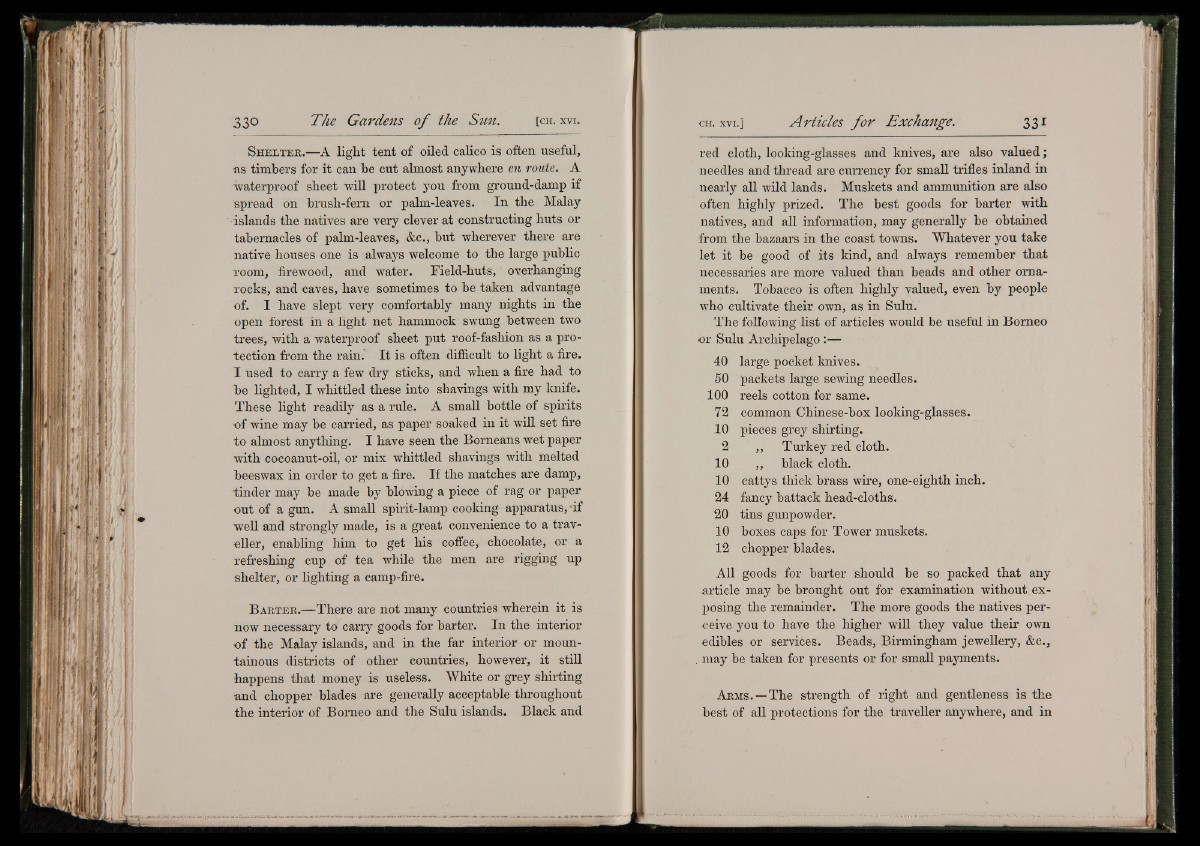
S h e l t e r .—A light tent of oiled calico is often useful,
as timbers for it can be cut almost anywhere en route. A
“waterproof sheet will protect you from ground-damp if
spread on brush-fem or palm-leaves. In the Malay
islands the natives are very clever at constructing huts or
tabernacles of palm-leaves, &c., but wherever there are
native houses one is always welcome to the large public
room, firewood, and water. Field-huts, overhanging
rocks, and caves, have sometimes to be taken advantage
of. I have slept very comfortably many nights in the
open forest in a light net hammock swung between two
trees, with a waterproof sheet put roof-fashion as a protection
from the rain. It is often difficult to light a fire.
I used to carry a few dry sticks, and when a fire had to
be lighted, I whittled these into shavings with my knife.
These light readily as a rule. A small bottle of spirits
•of wine may be carried, as paper soaked in it will set fire
to almost anything. I have seen the Borneans wet paper
with cocoanut-oil, or mix whittled shavings with melted
beeswax in order to get a fire. If the matches are damp,
“tinder may be made by blowing a piece of rag or paper
out of a gun. A small spirit-lamp cooking apparatus, "if
well and strongly made, is a great convenience to a traveller,
enabling him to get his coffee, chocolate, or a
refreshing cup of tea while the men are rigging up
shelter, or fighting a camp-fire.
B a r t e r .—There are not many countries wherein it is
now necessary to carry goods for barter. In the interior
o f the Malay islands, and in the far interior or mountainous
districts of other countries, however, it still
happens that money is useless. White or grey shirting
and chopper blades are generally acceptable throughout
the interior of Borneo and the Sulu islands. Black and
red cloth, looking-glasses and knives, are also valued ;
needles and thread are currency for small trifles inland in
nearly all wild lands. Muskets and ammunition are also
often highly prized. The best goods for barter with
natives, and all information, may generally be obtained
from the bazaars in the coast towns. Whatever you take
let it be good of its kind, and always remember that
necessaries are more valued than beads and other ornaments.
Tobacco is often highly valued, even by people
who cultivate their own, as in Sulu.
The following fist of articles would be useful in Borneo
or Sulu Archipelago :—
40 large pocket knives.
50 packets large sewing needles.
100 reels cotton for same.
72 common Chinese-box looking-glasses.
10 pieces grey shirting.
2 ,, Turkey red cloth.
10 ,, black cloth.
10 cattys thick brass wire, one-eighth inch.
24 fancy battack head-cloths.
20 tins gunpowder.
10 boxes caps for Tower muskets.
12 chopper blades.
All goods for barter should be so packed that any
article may be brought out for examination without exposing
the remainder. The more goods the natives perceive
you to have the higher will they value their own
edibles or services. Beads, Birmingham jewellery, &c.,
may be taken for presents or for small payments.
A rm s . —The strength of right and gentleness is the
best of all protections for the traveller anywhere, and in